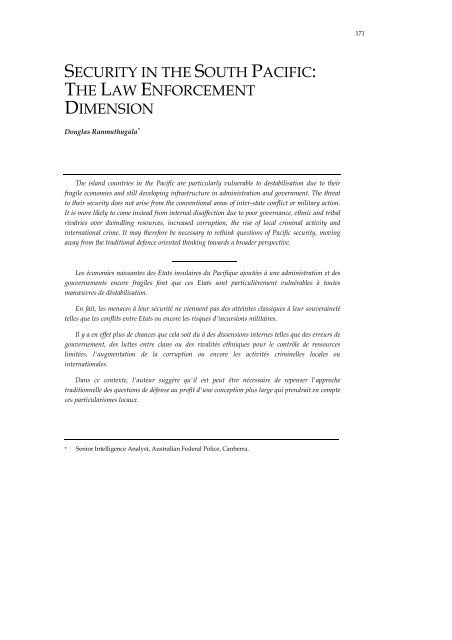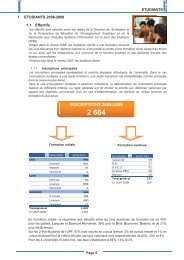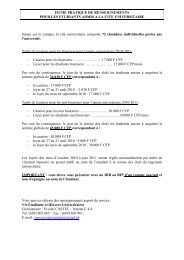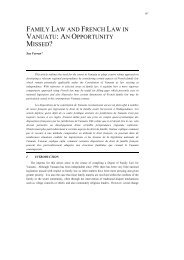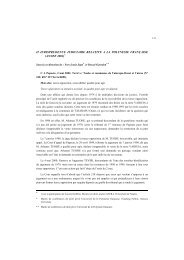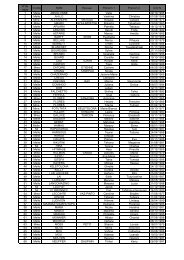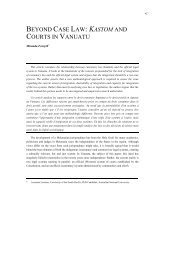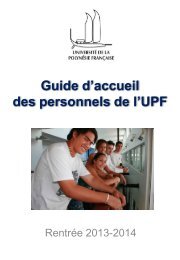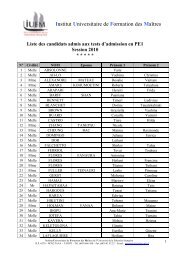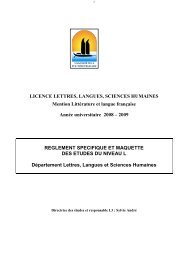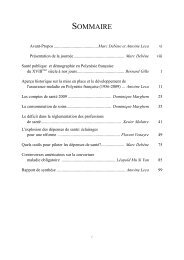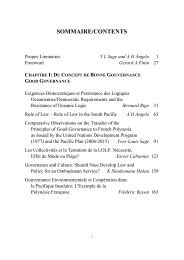security in the south pacific: the law enforcement dimension
security in the south pacific: the law enforcement dimension
security in the south pacific: the law enforcement dimension
Create successful ePaper yourself
Turn your PDF publications into a flip-book with our unique Google optimized e-Paper software.
171SECURITY IN THE SOUTH PACIFIC:THE LAW ENFORCEMENTDIMENSIONDouglas Ranmuthugala *The island countries <strong>in</strong> <strong>the</strong> Pacific are particularly vulnerable to destabilisation due to <strong>the</strong>irfragile economies and still develop<strong>in</strong>g <strong>in</strong>frastructure <strong>in</strong> adm<strong>in</strong>istration and government. The threatto <strong>the</strong>ir <strong>security</strong> does not arise from <strong>the</strong> conventional areas of <strong>in</strong>ter-state conflict or military action.It is more likely to come <strong>in</strong>stead from <strong>in</strong>ternal disaffection due to poor governance, ethnic and tribalrivalries over dw<strong>in</strong>dl<strong>in</strong>g resources, <strong>in</strong>creased corruption, <strong>the</strong> rise of local crim<strong>in</strong>al activity and<strong>in</strong>ternational crime. It may <strong>the</strong>refore be necessary to reth<strong>in</strong>k questions of Pacific <strong>security</strong>, mov<strong>in</strong>gaway from <strong>the</strong> traditional defence oriented th<strong>in</strong>k<strong>in</strong>g towards a broader perspective.Les économies naissantes des Etats <strong>in</strong>sulaires du Pacifique ajoutées à une adm<strong>in</strong>istration et desgouvernements encore fragiles font que ces Etats sont particulièrement vulnérables à toutesmanœuvres de déstabilisation.En fait, les menaces à leur sécurité ne viennent pas des atte<strong>in</strong>tes classiques à leur souvera<strong>in</strong>etételles que les conflits entre Etats ou encore les risques d'<strong>in</strong>cursions militaires.Il y a en effet plus de chances que cela soit du à des dissensions <strong>in</strong>ternes telles que des erreurs degouvernement, des luttes entre clans ou des rivalités ethniques pour le contrôle de ressourceslimitées, l'augmentation de la corruption ou encore les activités crim<strong>in</strong>elles locales ou<strong>in</strong>ternationales.Dans ce contexte, l'auteur suggère qu'il est peut être nécessaire de repenser l'approchetraditionnelle des questions de défense au profit d'une conception plus large qui prendrait en compteces particularismes locaux.* Senior Intelligence Analyst, Australian Federal Police, Canberra.
172 RJP (2001)IINTRODUCTIONThe post Cold War era has seen a search for threats to <strong>security</strong> <strong>in</strong> a very much broaderarea than what was looked at before. 1 One reason for this may be that <strong>the</strong> vast mach<strong>in</strong>erypoised to counter threats to <strong>security</strong> <strong>in</strong> <strong>the</strong> conventional sense now found that it wasrunn<strong>in</strong>g out of targets. Highly tra<strong>in</strong>ed and resourced agencies had to face ei<strong>the</strong>r dramaticcuts or reorient <strong>the</strong>mselves to face newly discovered threats. And suddenly, <strong>law</strong><strong>enforcement</strong> found that it was no longer <strong>the</strong> C<strong>in</strong>derella <strong>in</strong> <strong>the</strong> <strong>security</strong> field, and that it wasbe<strong>in</strong>g wooed by powerful agencies.But that is not <strong>the</strong> only cause for look<strong>in</strong>g at crime, or ra<strong>the</strong>r trans-national crime, as amajor threat to <strong>security</strong>, especially <strong>in</strong> smaller states. The last two decades saw dramaticchanges <strong>in</strong> communication technology, travel, commercial transport and f<strong>in</strong>ancialoperations, toge<strong>the</strong>r with lower<strong>in</strong>g of national barriers and <strong>in</strong>creased globalisation. Moneycould be transmitted rapidly across national boundaries, with considerable anonymity.Such transactions hardly left a paper trail. Travel was easy and fast while visa restrictionswere removed, reduced or where <strong>the</strong>y existed, easily circumvented by <strong>the</strong> utilisation ofpassports of convenience. Globalisation tended to reduce territorial boundaries stillfur<strong>the</strong>r. The constant movement of large volumes of currency between countries offeredcrim<strong>in</strong>al elements some degree of ease <strong>in</strong> merg<strong>in</strong>g <strong>the</strong>ir ill-gotten ga<strong>in</strong>s <strong>in</strong>to <strong>the</strong> swirl<strong>in</strong>gflow of legitimate money.Even <strong>in</strong> <strong>the</strong> case of middle level develop<strong>in</strong>g nations, threats to <strong>security</strong> from transnationalcrime are high. The value of earn<strong>in</strong>gs by organised crime is placed by <strong>the</strong> UnitedNations at around US$ 1.1 trillion per year. The <strong>in</strong>ternational drug trade alone exceedsUS$ 400 billion a year (McFarlane, 1999). That amount of money could obviously wieldconsiderable <strong>in</strong>fluence on <strong>the</strong> <strong>in</strong>ternational scene. It would "allow crim<strong>in</strong>al organizations toaccumulate a degree of power and wealth that rivals and <strong>in</strong> some cases surpasses thatpossessed by governments. As <strong>the</strong>se organizations become more deeply entrenched <strong>in</strong><strong>the</strong>ir respective societies, <strong>the</strong>y pose a threat to both democracy and <strong>the</strong> rule of <strong>law</strong>"(Williams and Savona, 1996).The impact of trans-national crime on <strong>the</strong> <strong>security</strong> of states is perhaps more evident <strong>in</strong><strong>the</strong> case of relatively small Pacific Island nations. Most of <strong>the</strong>se states have poorlydeveloped economies and limited adm<strong>in</strong>istrative and political expertise. Some states suchas Niue have populations less than 2000. Such small nations would be easy prey to big1 The op<strong>in</strong>ions expressed <strong>in</strong> this article are those of <strong>the</strong> author and do not necessarily reflect <strong>the</strong>policy of <strong>the</strong> Australian Federal Police (AFP). The author has based his assumptions andobservations largely on empirical data ga<strong>the</strong>red dur<strong>in</strong>g 19 years of police work <strong>in</strong> <strong>the</strong> Pacific.References have been provided where published works or statements of <strong>in</strong>dividuals have beenquoted.
SECURITY IN THE SOUTH PACIFIC: THE LAW ENFORCEMENT DIMENSION 173<strong>in</strong>ternational crim<strong>in</strong>al organisations <strong>in</strong> search of a base for <strong>the</strong>ir illicit operations or a targetfor fraud. The need to guard aga<strong>in</strong>st such attack would be paramount for <strong>the</strong>se smallerstates struggl<strong>in</strong>g to make ends meet and fac<strong>in</strong>g with apprehension <strong>the</strong> loom<strong>in</strong>g cloud off<strong>in</strong>ancial catastrophe visible just over <strong>the</strong> horizon.IIIS THERE A NEED FOR A CHANGE OF PARADIGM?The end of <strong>the</strong> Cold War did not signify <strong>the</strong> end of conflict. Today, all over <strong>the</strong> world,low <strong>in</strong>tensity conflict is rag<strong>in</strong>g, almost uncontrolled <strong>in</strong> some regions. The vision of peacebreak<strong>in</strong>g out all over <strong>the</strong> world still rema<strong>in</strong>s a pipedream. The bulk of <strong>the</strong>se conflicts arebased on ethnic, religious or ideological grounds, and rarely on territorial disputes. In1999, of 27 major armed conflicts recorded, all but two were <strong>in</strong>ternal (Yearbook 2000).Exceptions are <strong>in</strong>stances such as <strong>the</strong> dispute over territory between India and Pakistan and<strong>the</strong> Balkan conflicts. These conflicts ensure that <strong>the</strong> old paradigm of <strong>security</strong> is still valid tosome extent, though more often than not <strong>the</strong> conflict is <strong>in</strong>tra-state as opposed to <strong>in</strong>ter-state.In countries that do not face such conflict, threats to <strong>security</strong> are still <strong>the</strong>re, and perhapsgrow<strong>in</strong>g. These threats are not those that could be dealt with by a well-tra<strong>in</strong>ed andequipped army. They are more <strong>in</strong>sidious and less apparent to <strong>the</strong> non-observant eye. Theymay develop from with<strong>in</strong> <strong>the</strong> country or appear from <strong>the</strong> <strong>in</strong>ternational scene. A goodexample of <strong>the</strong> former is corruption where <strong>the</strong> very raison d'etre of a State can beunderm<strong>in</strong>ed to such an extent that <strong>security</strong> of <strong>the</strong> nation would be at great risk. This hasbeen noticeable <strong>in</strong> some African and South American nations where corruption hasbecome endemic.External threats would arise most notably from crim<strong>in</strong>al activities conducted byorganised crim<strong>in</strong>al groups or even entrepreneurial crim<strong>in</strong>als operat<strong>in</strong>g <strong>in</strong>dividually. Theseattacks can take <strong>the</strong> form of fraud aimed at <strong>the</strong> country itself or activities such as moneylaunder<strong>in</strong>g that will have tangential effects <strong>in</strong> discredit<strong>in</strong>g <strong>the</strong> country <strong>in</strong> its stand<strong>in</strong>g <strong>in</strong> <strong>the</strong>world f<strong>in</strong>ancial community. The Russian Central Bank had claimed that up to US$ 80billion (A$153 billion) was manipulated through banks chartered <strong>in</strong> Niue (AFP News2000). The list<strong>in</strong>g of several Pacific Island nations by US monetary authorities as f<strong>in</strong>anciallyquestionable dur<strong>in</strong>g <strong>the</strong> past year is an example of this aspect. In <strong>the</strong> case of one Pacificnation, <strong>the</strong> cash flow situation fell <strong>in</strong>to dire straits and <strong>the</strong> country had to be bailed out by<strong>the</strong> United States provid<strong>in</strong>g it temporary relief. 22 In 1999, Nauru faced a major cash flow problem when foreign f<strong>in</strong>ancial <strong>in</strong>stitutions black listed it.Nauru has to import all its needs, and a return to a subsistence economy is not possible. There isno local agriculture or even a proper supply of water. If <strong>the</strong> cash flow is blocked, <strong>the</strong> daily needsof <strong>the</strong> population cannot be met. The US <strong>in</strong>tervened by arrang<strong>in</strong>g with <strong>the</strong> First Hawaiian Bank toprovide relief.
174 RJP (2001)McFarlane (1994) lists five types of crime that have an impact on national or<strong>in</strong>ternational stability. These are listed below, with an emphasis on <strong>the</strong>ir effect on <strong>the</strong>Pacific.(1) Corruption: As mentioned earlier, corruption can have a serious de-stabilis<strong>in</strong>g effecton countries. Russia <strong>in</strong> recent times has provided a good example of this problem.Corruption had eroded <strong>the</strong> confidence of <strong>the</strong> people <strong>in</strong> <strong>the</strong>ir government and ledto serious f<strong>in</strong>ancial and social repercussions. It is reported that corruption haspermeated all aspects of <strong>the</strong> State apparatus <strong>in</strong> Russia and that it enabled crim<strong>in</strong>alelements to dra<strong>in</strong> out <strong>the</strong> currency reserves of <strong>the</strong> country.(2) Drug Traffick<strong>in</strong>g: The multi-million dollar profits earned by organised crime groupsdeal<strong>in</strong>g <strong>in</strong> drugs may be used to suborn <strong>the</strong> State through corruption of politicians,adm<strong>in</strong>istrators and <strong>law</strong> <strong>enforcement</strong> officers. This has been clearly demonstrated<strong>in</strong> some South American countries and even Asian countries such as Pakistan. Insmall Pacific Island nations, <strong>the</strong> chances of corrupt<strong>in</strong>g <strong>in</strong>experienced politiciansand officials are very high, especially as costs of ma<strong>in</strong>ta<strong>in</strong><strong>in</strong>g political powerescalate <strong>in</strong> monetary terms and 'vote-buy<strong>in</strong>g' becomes more prevalent. There havebeen cases of Australian crim<strong>in</strong>al identities pay<strong>in</strong>g regular sums of money topoliticians likely to come to power <strong>in</strong> <strong>the</strong>ir own countries. In one recorded<strong>in</strong>stance, <strong>the</strong> politician did come to power, though by that time <strong>the</strong> 'donor' had metwith an untimely death.(3) Narco-terrorism: This is one aspect that has not been manifest <strong>in</strong> a significant way <strong>in</strong><strong>the</strong> Pacific though it has led to major destabilisation <strong>in</strong> countries such as Italy andLebanon. In Colombia and Peru, narco-terrorism had led to <strong>the</strong> loss of at least24,000 lives <strong>in</strong> 1991 alone, when terrorists and <strong>in</strong>surgent groups comb<strong>in</strong>ed withdrug cartels to thwart Government control. This compares with around 3000deaths through terrorist activity <strong>in</strong> Nor<strong>the</strong>rn Ireland over <strong>the</strong> past 25 years.(4) Organised Crime: Russia is a good example of <strong>the</strong> effect of organised crime on<strong>security</strong> of <strong>the</strong> state. "Crim<strong>in</strong>ality has become <strong>the</strong> most important factorthreaten<strong>in</strong>g <strong>the</strong> change towards (democratisation) <strong>in</strong> Russia. In particular,organised crime underm<strong>in</strong>es <strong>the</strong> economy, safety and <strong>security</strong> of <strong>the</strong> Russianpeople" (Chebotarev, 1993).(5) Fraud and White Collar Crime: Fraud can lead to <strong>the</strong> collapse of f<strong>in</strong>ancial <strong>in</strong>stitutions,as seen <strong>in</strong> <strong>the</strong> cases of <strong>the</strong> Bank of Credit and Commerce (BCCI) <strong>in</strong> UK 3 and <strong>the</strong>3 BCCI was a largely Abu Dhabi owned bank with assets exceed<strong>in</strong>g US$23b. Depositors werealleged to have been defrauded of over US$20b, and <strong>the</strong> collapse had significant repercussions <strong>in</strong><strong>the</strong> British bank<strong>in</strong>g sector.
SECURITY IN THE SOUTH PACIFIC: THE LAW ENFORCEMENT DIMENSION 175recent allegations of fraud <strong>in</strong>volv<strong>in</strong>g <strong>the</strong> Bank of Ch<strong>in</strong>a. In <strong>the</strong> latter case, <strong>the</strong> sumalleged to have been misappropriated was US$28 billion, out of which US$10billion, represent<strong>in</strong>g about 50 per cent of Ch<strong>in</strong>a's foreign reserves, is alleged tohave been sent overseas. Vanuatu and Nauru have had near escapes from cases ofpotentially devastat<strong>in</strong>g fraud, fortunately diverted <strong>in</strong> time (Post-Courier 1997,McLeahy 1997). AFP and Victoria police had <strong>in</strong>vestigated similar attempts <strong>in</strong> 1997by Australian crim<strong>in</strong>al groups <strong>in</strong> Solomon Islands. In <strong>the</strong> case of <strong>the</strong> Pacific, <strong>the</strong>commonest fraud deals with bank guarantees sought by crim<strong>in</strong>al elements,<strong>in</strong>volv<strong>in</strong>g sums that were well above affordable levels of <strong>the</strong> country concerned.There are o<strong>the</strong>r causes that could lead to de-stabilisation <strong>in</strong> countries. These cover awide spectrum from political <strong>in</strong>stability, ethnic and ideological divisions, and political andadm<strong>in</strong>istrative <strong>in</strong>efficiency to environmental problems and <strong>the</strong> rapid erosion of availablenatural resources. This paper, however, will concentrate on areas affected by <strong>law</strong><strong>enforcement</strong>.IIICURRENT SITUATION IN THE PACIFICIf one were to look for a s<strong>in</strong>gle word that could be applied across <strong>the</strong> board <strong>in</strong>describ<strong>in</strong>g <strong>the</strong> situation <strong>in</strong> Pacific Island nations, that word would be 'vulnerable'. Most of<strong>the</strong>m are very small <strong>in</strong> land area and population, and some have m<strong>in</strong>imal resources. PapuaNew Gu<strong>in</strong>ea (PNG) is perhaps <strong>the</strong> exception, with its landmass of 461,000 sq km andpopulation exceed<strong>in</strong>g 4.7 million. At <strong>the</strong> o<strong>the</strong>r end of <strong>the</strong> spectrum are island nations suchas Niue cover<strong>in</strong>g 258 sq km, with a population of only about 2000. Any ill w<strong>in</strong>d that blowsacross <strong>the</strong> South Pacific could do damage to <strong>the</strong> fragile economies of <strong>the</strong>se countries.Dur<strong>in</strong>g <strong>the</strong> past fifty years at least, <strong>the</strong>re was no <strong>in</strong>ter-nation warfare <strong>in</strong>volv<strong>in</strong>g <strong>the</strong>island nations of <strong>the</strong> South Pacific. The only military <strong>in</strong>tervention was <strong>in</strong> Vanuatu <strong>in</strong> 1980when a unit of <strong>the</strong> Papua New Gu<strong>in</strong>ea Defence Force (PNGDF) arrived to assist <strong>the</strong> localGovernment to deal with <strong>the</strong> Santo affair. In Papua New Gu<strong>in</strong>ea itself, <strong>the</strong> military wasdeployed <strong>in</strong> <strong>the</strong> prov<strong>in</strong>ce of North Solomons to deal with an <strong>in</strong>surgency. But <strong>in</strong> <strong>the</strong> lattercase, it was an <strong>in</strong>ternal matter with<strong>in</strong> national borders. In a region where <strong>in</strong> Melanesiaalone, <strong>the</strong>re are over 1200 dist<strong>in</strong>ct cultures, those two cases are not significant at all. AsCrocombe (2000) says, "It is a credit to Melanesians that conflict has not been greater. Theyhave achieved a degree of national cohesion and stability much faster than Europe or Asiadid".This fortunate situation enabled most Pacific Island nations to do away with <strong>the</strong>expensive pastime of hav<strong>in</strong>g a military establishment. Among <strong>the</strong> Pacific Island nations,only PNG, Fiji and Tonga have military forces. Tonga is <strong>the</strong> odd man out <strong>in</strong> <strong>the</strong> region, <strong>in</strong><strong>the</strong> sense that it is a monarchy where democratic <strong>in</strong>stitutions have not reached full bloom.The army <strong>in</strong> that country performs largely a ceremonial role and has not figured <strong>in</strong> any
176 RJP (2001)affairs of <strong>the</strong> State. In <strong>the</strong> o<strong>the</strong>r two countries, <strong>the</strong> military forces have unfortunatelydeveloped a poor reputation vis a vis <strong>security</strong>, be<strong>in</strong>g more a cause than an antidote for<strong>in</strong>stability. One must, however, credit <strong>the</strong> Fiji military forces for hav<strong>in</strong>g earned an enviablereputation <strong>in</strong> peacekeep<strong>in</strong>g <strong>in</strong> <strong>the</strong> troubled Middle East. Forces <strong>in</strong> both <strong>the</strong>se countries hadalso served with dist<strong>in</strong>ction dur<strong>in</strong>g World War II.Papua New Gu<strong>in</strong>ea does <strong>in</strong>deed have a case for <strong>the</strong> retention of a military force. It is<strong>the</strong> only island nation with a land border, <strong>in</strong> this case, with <strong>the</strong> troubled Indonesianprov<strong>in</strong>ce of West Papua. Problems <strong>in</strong>volv<strong>in</strong>g <strong>the</strong> movement of <strong>in</strong>surgents from WestPapua <strong>in</strong>to PNG territory and <strong>the</strong> need to patrol <strong>the</strong> border would necessitate a militarypresence. The need to ma<strong>in</strong>ta<strong>in</strong> <strong>the</strong> <strong>security</strong> of <strong>the</strong> State aga<strong>in</strong>st <strong>in</strong>ternal separatistmovements too would argue for such an arrangement.The case for a military force <strong>in</strong> Fiji is less easy to defend. The country has no externalthreat to face or a land border to police. So far, <strong>the</strong> military forces <strong>in</strong> <strong>the</strong> country havefigured <strong>in</strong> two major attacks on <strong>the</strong> stability of <strong>the</strong> State. But with around 1000 soldiersengaged <strong>in</strong> peacekeep<strong>in</strong>g tasks worldwide, Fiji would f<strong>in</strong>d it difficult to review <strong>the</strong> issue,as peacekeep<strong>in</strong>g duties have been f<strong>in</strong>ancially beneficial and bolster national pride.The o<strong>the</strong>r <strong>in</strong>dependent island nations <strong>in</strong> <strong>the</strong> region rely on <strong>the</strong>ir police forces to dealwith all aspects of <strong>in</strong>ternal <strong>security</strong>, <strong>in</strong>clud<strong>in</strong>g surveillance of borders and exclusiveeconomic zones. Police serve on <strong>the</strong> patrol boats supplied by Australia under <strong>the</strong> PacificBoat scheme. 4 Vanuatu and <strong>the</strong> Solomon Islands have para-military sections of <strong>the</strong> policeforces that attend to <strong>the</strong>se tasks. In both countries, <strong>the</strong>se para-military units have figured <strong>in</strong>situations of <strong>in</strong>stability. It was especially so <strong>in</strong> Vanuatu where <strong>the</strong> Vanuatu Mobile Force(VMF) had virtually set <strong>the</strong>mselves up as a military force, and developed an unenviablerecord <strong>in</strong> undiscipl<strong>in</strong>ed behaviour. The most notable case occurred <strong>in</strong> 1994 when elementsof <strong>the</strong> VMF abducted <strong>the</strong> President and mut<strong>in</strong>ied over alleged payment problems.However, it would be unfair to associate <strong>the</strong> presence of military or para-militaryforces with <strong>in</strong>stability. What is more useful is to exam<strong>in</strong>e whe<strong>the</strong>r de-stabilis<strong>in</strong>g factorswere already present <strong>in</strong> <strong>the</strong> country, creat<strong>in</strong>g a need for <strong>the</strong> establishment of such units. In<strong>the</strong> case of Vanuatu, <strong>the</strong> problems <strong>in</strong> Santo perhaps gave some validity for <strong>the</strong> need of a4 Australia announced <strong>the</strong> Pacific Patrol Boat project <strong>in</strong> August 1983, designed to assist a number ofSouth Pacific countries with a capability to monitor <strong>the</strong>ir economic zones. Under this project, 22patrol boats were supplied to <strong>the</strong> selected countries, <strong>the</strong> first <strong>in</strong> 1987 to PNG while <strong>the</strong> last was to<strong>the</strong> Federated States of Micronesia <strong>in</strong> 1997. The boats had a life span of 15 years but it has s<strong>in</strong>cebeen determ<strong>in</strong>ed that complete refits would be done at <strong>the</strong> end of that period, add<strong>in</strong>g ano<strong>the</strong>r 15years to <strong>the</strong>ir life. The package <strong>in</strong>cluded tra<strong>in</strong><strong>in</strong>g of crew, provision of advisers, and meet<strong>in</strong>g costof refits and some aspects of ma<strong>in</strong>tenance. The boats are used extensively <strong>in</strong> search and rescueoperations, surveillance, polic<strong>in</strong>g tasks and, <strong>in</strong> some cases, border patroll<strong>in</strong>g (Berg<strong>in</strong> and Bateman,1999, RAN 2000, www).
SECURITY IN THE SOUTH PACIFIC: THE LAW ENFORCEMENT DIMENSION 177body capable of tak<strong>in</strong>g on a coercive role. As far as <strong>the</strong> Solomon Islands is concerned, priorto <strong>the</strong> current 'troubles' <strong>the</strong> major problem was <strong>in</strong> <strong>the</strong> islands border<strong>in</strong>g PNG dur<strong>in</strong>g <strong>the</strong>Bouga<strong>in</strong>ville <strong>in</strong>surrection <strong>in</strong> 1988. Both <strong>the</strong> Bouga<strong>in</strong>ville Revolutionary Army and <strong>the</strong> PNGDefence Force ignored <strong>the</strong> territorial border from time to time. This even led to somedestruction of property <strong>in</strong> <strong>the</strong> Western Prov<strong>in</strong>ce of <strong>the</strong> Solomon Islands. But <strong>the</strong> paramilitaryunit of <strong>the</strong> Royal Solomons Island Police (RSIP) had been established much earlierat a time when urban public order situations were <strong>the</strong> only threats <strong>in</strong> <strong>the</strong> horizon. Thatthreat was well with<strong>in</strong> <strong>the</strong> ambit of police riot squads to deal with. Never<strong>the</strong>less it is a factthat <strong>the</strong> 'militarisation' of <strong>the</strong> Reconnaissance and Surveillance Unit of <strong>the</strong> RSIP occurreddur<strong>in</strong>g <strong>the</strong> height of <strong>the</strong> Bouga<strong>in</strong>ville episode. Assault rifles and General Purpose Mach<strong>in</strong>eGuns (GPMG) replaced riot gear, a change that has had tragic consequences dur<strong>in</strong>g <strong>the</strong>militancy problems <strong>in</strong> Guadalcanal <strong>in</strong> 2000.Members of <strong>the</strong> Mobile Forces from Vanuatu and <strong>the</strong> Solomon Islands have taken part<strong>in</strong> peacekeep<strong>in</strong>g operations <strong>in</strong> Bouga<strong>in</strong>ville, and those from Fiji and Vanuatu <strong>in</strong> <strong>the</strong>Solomon Islands. However, with <strong>the</strong> exception of those from Fiji, <strong>the</strong> units from <strong>the</strong>secountries have failed to make an impact <strong>in</strong> <strong>the</strong> field. Sometimes, such operations could becounter-productive. As Bell (1994) says of <strong>the</strong> United Nations, if any organisation "takes ontasks for which it is not fitted, and which it cannot susta<strong>in</strong> or conclude effectively, it willdamage itself as well as <strong>the</strong> people of <strong>the</strong> area concerned".The major threats to Pacific Island nations are <strong>in</strong>ternal. Of <strong>the</strong>se, problems of <strong>law</strong><strong>enforcement</strong> stand out as one of <strong>the</strong> major issues. These problems vary from country tocountry. In PNG, violent crime has become <strong>the</strong> major threat. Unlike <strong>in</strong> Russia, where fraudand o<strong>the</strong>r types of white-collar crime had made <strong>in</strong>roads <strong>in</strong>to <strong>the</strong> adm<strong>in</strong>istration, PNG facescrime <strong>in</strong> <strong>the</strong> 'raw' or violent version. In Port Moresby, a siege mentality has developed dueto <strong>the</strong> feel<strong>in</strong>g of <strong>in</strong><strong>security</strong> experienced by residents and by commercial enterprises.Attacks on banks, restaurants, or any commercial <strong>in</strong>stitute with cash on <strong>the</strong> premises haveescalated. At <strong>the</strong> same time, violence has become almost gratuitous. The rate of murder orserious <strong>in</strong>jury due to crime has escalated dramatically. Bus<strong>in</strong>ess enterprises have to<strong>in</strong>crease <strong>the</strong>ir prices to cover <strong>security</strong>. Physical <strong>security</strong> measures have to be establishedaround <strong>in</strong>stitutions and guards employed on a 24 hour basis. Transport of goods andmoney becomes a costly and dangerous exercise. At <strong>the</strong> top end of <strong>the</strong> scale, un<strong>law</strong>fulgroups have threatened even <strong>the</strong> Parliament itself and some politicians have becomedependent on crim<strong>in</strong>al elements for <strong>the</strong>ir safety and even for <strong>the</strong> retention of power.Even <strong>in</strong> <strong>the</strong> Solomon Islands, subsequent to <strong>the</strong> <strong>in</strong>itial outbreak of violence due toethnic clashes, crime has become a major obstacle to peace. While <strong>the</strong> leaders areparticipat<strong>in</strong>g <strong>in</strong> negotiations, <strong>the</strong> economy is be<strong>in</strong>g brought to its knees by crim<strong>in</strong>alsattack<strong>in</strong>g commercial enterprises, extort<strong>in</strong>g large sums of money and generally practis<strong>in</strong>g
178 RJP (2001)loot<strong>in</strong>g and pillage on all and sundry. Each such act adds ano<strong>the</strong>r obstacle to <strong>the</strong> alreadyoverburdened tasks of <strong>the</strong> negotiators at <strong>the</strong> peace talks.Externally, <strong>the</strong> crim<strong>in</strong>al threat poses a different type of danger. Many island states havebeen victimised by crim<strong>in</strong>als and unscrupulous f<strong>in</strong>anciers. Hardly a month passes withouta new group of 'benefactors' offer<strong>in</strong>g <strong>the</strong> cash strapped government of some small islandnation a package of assistance from dubious sources. These range from treasures of ancientOrders with a mandate to do good to <strong>the</strong> needy, to a share of "Hitler's or Marcos' gold".Offers have been made to set up <strong>in</strong>vestment schemes rang<strong>in</strong>g from grandiose holidayresorts to m<strong>in</strong>es look<strong>in</strong>g for non-existent m<strong>in</strong>erals and even <strong>the</strong>atre productions thatcannot fail. The magnatite affair <strong>in</strong> Vanuatu and <strong>the</strong> musical <strong>in</strong> London f<strong>in</strong>anced by Nauruare two good examples. 5 In <strong>the</strong> case of offered assistance, <strong>the</strong> receiv<strong>in</strong>g country is asked toprovide Bank Guarantees for a substantial sum to 'show good will'. In one <strong>in</strong>stance, <strong>the</strong>Government of Vanuatu signed Bank Guarantees to a value exceed<strong>in</strong>g <strong>the</strong> annual budgetof <strong>the</strong> country (Post-Courier, 1997, McLeahy, 1997). It took <strong>the</strong> comb<strong>in</strong>ed efforts of <strong>law</strong><strong>enforcement</strong> agencies <strong>in</strong> several countries to retrieve <strong>the</strong> <strong>in</strong>struments and to br<strong>in</strong>g <strong>the</strong>offenders to justice.A more <strong>in</strong>sidious threat is posed by <strong>the</strong> proliferation of off shore bank<strong>in</strong>g centres <strong>in</strong> <strong>the</strong>Pacific and <strong>the</strong> spread of cyber-crime. In <strong>the</strong> case of several countries, <strong>the</strong> existence ofpoorly regulated off shore centres led to countries like <strong>the</strong> U.S. tak<strong>in</strong>g punitive fiscalmeasures aga<strong>in</strong>st <strong>the</strong>m. In 1999, three countries were blacklisted by American <strong>in</strong>ternationalbanks, lead<strong>in</strong>g to considerable f<strong>in</strong>ancial distress. 6The <strong>in</strong>ternet suddenly appeared as a heaven-sent source of earn<strong>in</strong>g money withm<strong>in</strong>imum outlay and effort. The establishment of <strong>in</strong>ternet gambl<strong>in</strong>g, e-market<strong>in</strong>g andrent<strong>in</strong>g or sale of cyber space became quite lucrative to small nations look<strong>in</strong>g for cash. Theamounts earned were significantly large and <strong>the</strong>re was no visible danger to <strong>the</strong> country.While such activity is not necessarily crim<strong>in</strong>al, one of <strong>the</strong> possible harmful effects could bef<strong>in</strong>ancial ostracis<strong>in</strong>g by developed countries.5 The Vanuatu Government was offered <strong>in</strong> 1997 a development scheme cost<strong>in</strong>g about 1.5 billion USdollars on <strong>the</strong> grounds that 4 billion tonnes of magnetite was found <strong>in</strong> <strong>the</strong> country. There was noevidence to show that such a deposit existed. In 1993 <strong>the</strong> Nauru Government underwrote amusical titled "Leonardo' <strong>in</strong> London, produced by <strong>the</strong> adviser himself, to <strong>the</strong> tune of 4.5mAustralian dollars. The entire Cab<strong>in</strong>et was flown by chartered aircraft to attend <strong>the</strong> premiere. Theshow collapsed after one month.6 In late 1999, Palau, Vanuatu and Nauru were blacklisted by several <strong>in</strong>ternational banks <strong>in</strong> <strong>the</strong> U.S.over concerns regard<strong>in</strong>g money launder<strong>in</strong>g. Such action could be a dis<strong>in</strong>centive to <strong>in</strong>vestment anddisrupt f<strong>in</strong>ancial activity of <strong>the</strong> countries concerned.
SECURITY IN THE SOUTH PACIFIC: THE LAW ENFORCEMENT DIMENSION 179The effect of succumb<strong>in</strong>g to such crim<strong>in</strong>al attacks would be devastat<strong>in</strong>g especially tosmaller economies that have no reserve to fall back upon. A country could easily facebankruptcy and its <strong>in</strong>vestments and resources lost beyond redemption.It is unfortunate that most Pacific Island States do not have <strong>law</strong> <strong>enforcement</strong> mach<strong>in</strong>erythat can effectively deal with <strong>the</strong>se problems. In some cases such as violent crime or <strong>the</strong>simpler types of fraud, a well-tra<strong>in</strong>ed and resourced police force would be able to dealsatisfactorily with <strong>the</strong> problem. Unfortunately, even <strong>in</strong> larger countries with significantresources such as PNG, <strong>the</strong> police forces are poorly equipped, <strong>in</strong>adequately tra<strong>in</strong>ed andlack resources necessary for operations. As a result of <strong>the</strong>se shortcom<strong>in</strong>gs, <strong>the</strong> morale ofpolice personnel falls, <strong>the</strong>reby enter<strong>in</strong>g a vicious spiral that pushes <strong>the</strong> <strong>law</strong> <strong>enforcement</strong>effort downwards at an ever-<strong>in</strong>creas<strong>in</strong>g rate.Most Pacific Island States would f<strong>in</strong>d <strong>the</strong> tackl<strong>in</strong>g of cyber-crime and o<strong>the</strong>r moresophisticated attacks on <strong>the</strong> <strong>security</strong> of <strong>the</strong> state, with any degree of success, beyond <strong>the</strong>capability of <strong>the</strong>ir <strong>law</strong> <strong>enforcement</strong> agencies. Even for <strong>the</strong> <strong>law</strong> <strong>enforcement</strong> agencies ofdeveloped nations this is new territory. "New technology enables various forms of crime tobe carried out from remote sites, faster, with greater anonymity and on a larger scale.Electronic crime is difficult to detect and <strong>in</strong>vestigate because it is often multi-jurisdictional,committed at great speed, and <strong>the</strong> electronic trails go cold very quickly" (Keelty 2000).The trade <strong>in</strong> illicit drugs is perhaps one of <strong>the</strong> most destabilis<strong>in</strong>g factors <strong>in</strong> <strong>the</strong> world.Estimated by <strong>the</strong> United Nations International Drug Control Programme to be <strong>in</strong> <strong>the</strong>region of US$400 billion, it is approximately eight percent of total <strong>in</strong>ternational trade (TheEconomist, 1997). In several South American countries, drug barons have assumed powerover political leaders by colossal levels of bribery.The situation <strong>in</strong> <strong>the</strong> Pacific is not as serious but has <strong>the</strong> potential to develop <strong>in</strong>to amajor destabilis<strong>in</strong>g factor. Currently, <strong>the</strong> only illicit drug produced <strong>in</strong> commercialquantities <strong>in</strong> <strong>the</strong> region is cannabis, and that too only <strong>in</strong> very few countries. Even where itis produced, <strong>the</strong>re is still a discernible lack of sophistication <strong>in</strong> process<strong>in</strong>g and market<strong>in</strong>g.While <strong>the</strong> trade <strong>in</strong> cannabis is lucrative, it has still not reached levels where it could make asignificant impact on local politics or <strong>the</strong> <strong>security</strong> of a state.The danger lies largely <strong>in</strong> <strong>the</strong> prospect of <strong>in</strong>ternational drug traffick<strong>in</strong>g where <strong>the</strong>region would become a transit po<strong>in</strong>t <strong>in</strong> global trade routes. Australia and New Zealand aretarget countries for <strong>the</strong> trade <strong>in</strong> hero<strong>in</strong>, coca<strong>in</strong>e and cannabis. The major flow of hero<strong>in</strong> andcannabis is from <strong>the</strong> so-called Golden Triangle, especially from Burma, and <strong>the</strong> GoldenCrescent, compris<strong>in</strong>g ma<strong>in</strong>ly Afghanistan and Pakistan. Coca<strong>in</strong>e is routed via <strong>the</strong> Pacificfrom South America. Dur<strong>in</strong>g <strong>the</strong> last ten years, seizures by Australian Law EnforcementAgencies, ma<strong>in</strong>ly <strong>the</strong> Australian Federal Police, <strong>in</strong>dicate that <strong>the</strong>re is <strong>in</strong>deed a considerableflow of such illicit drugs. In 1994, 15 tonnes of cannabis res<strong>in</strong> were seized, with <strong>the</strong>
180 RJP (2001)operation stretch<strong>in</strong>g from Australia to Noumea. In 1997, ten tonnes of cannabis res<strong>in</strong> wereseized <strong>in</strong> Australian waters while <strong>the</strong> ship that brought <strong>the</strong> drugs to <strong>the</strong> Pacific was seized<strong>in</strong> New Caledonia. In 1999, <strong>the</strong> AFP and o<strong>the</strong>r <strong>law</strong> <strong>enforcement</strong> agencies seized 50kilograms of hero<strong>in</strong> shipped to Australia via Vanuatu. In October 2000, AFP officersassisted <strong>the</strong> Fijian police to seize 357 kilograms of hero<strong>in</strong> <strong>in</strong> Suva and to dismantle acrim<strong>in</strong>al r<strong>in</strong>g with connections to several countries.The nexus between illicit trade <strong>in</strong> drugs and organised crime has been too welldocumented to bear repetition. 7 The drug trade is <strong>in</strong>variably followed by organisedcrim<strong>in</strong>al activity, corruption of political and adm<strong>in</strong>istrative leaders, and social upheaval.The permeative effects of drug abuse have been seen <strong>in</strong> many countries through which <strong>the</strong>trade passes. Pakistan has been used as a conduit for hero<strong>in</strong> and cannabis produced <strong>in</strong>Afghanistan, which lacks a seacoast. Today, abuse of illicit substances, ma<strong>in</strong>ly hero<strong>in</strong>, <strong>in</strong>Pakistan has reached unbearable proportions, with percentage figures of addicts higherthan <strong>in</strong> any o<strong>the</strong>r country. A similar situation has arisen <strong>in</strong> Ch<strong>in</strong>a, where <strong>the</strong> number ofofficially registered addicts quadrupled dur<strong>in</strong>g <strong>the</strong> last decade. Unleash<strong>in</strong>g this spectre on<strong>the</strong> fragile political systems and economies <strong>in</strong> <strong>the</strong> Pacific could lead to horrendous results,pos<strong>in</strong>g perhaps <strong>the</strong> biggest threat to <strong>security</strong> <strong>in</strong> <strong>the</strong> region.IVCASE STUDIESA Papua New Gu<strong>in</strong>eaIn its 25 years of existence as an <strong>in</strong>dependent State, PNG has faced many threats to its<strong>security</strong>. A country with over 700 different clans, it faced problems right from itsformation. Moves for autonomy by some prov<strong>in</strong>ces predated <strong>in</strong>dependence. Tribal warfarewas a regular feature <strong>in</strong> <strong>the</strong> newly <strong>in</strong>dependent nation. An <strong>in</strong>surrection <strong>in</strong> <strong>the</strong> NorthSolomons Prov<strong>in</strong>ce flared <strong>in</strong>to near civil war <strong>in</strong> 1988 and has been fester<strong>in</strong>g ever s<strong>in</strong>ce. Anattempt to end <strong>the</strong> problem <strong>in</strong> Bouga<strong>in</strong>ville by us<strong>in</strong>g mercenaries created a major <strong>security</strong>problem <strong>in</strong> 1998 <strong>in</strong> what is known as Sandl<strong>in</strong>e Affair. 8 Crime has escalated <strong>in</strong> <strong>the</strong> cities and7 Evidence of this nexus is extensively documented <strong>in</strong> several papers produced by <strong>the</strong> USDepartments of State and Justice, examples be<strong>in</strong>g (a) International Narcotics Control StrategyReport, Money Launder<strong>in</strong>g: A Chang<strong>in</strong>g Scenario (1997) US Dept. of State Wash<strong>in</strong>gton, and (b) USDepartment of Justice, The National Money Launder<strong>in</strong>g Strategy for 1999 (1999) Wash<strong>in</strong>gton. Severalarticles are also available on web site www.ex.ac.uk/~Rdavies/arian/scandals/launder.html Anexample is South, N, On Cool<strong>in</strong>g Hot Money: Transatlantic Trends <strong>in</strong> Drug-related Money Launder<strong>in</strong>gand its Facilitation (1995) www.alternatives.com/crime/SOUTH.HTML.8 In 1998 <strong>the</strong> Government of PNG sought <strong>the</strong> assistance of <strong>the</strong> mercenary group Sandl<strong>in</strong>e to putdown <strong>the</strong> rebellion <strong>in</strong> Bouga<strong>in</strong>ville. The episode ended when <strong>the</strong> Commander of <strong>the</strong> DefenceForce arrested <strong>the</strong> Sandl<strong>in</strong>e personnel and deported <strong>the</strong>m. This led to a serious destabilisation of<strong>the</strong> country, but <strong>the</strong> democratic <strong>in</strong>stitutions stood <strong>the</strong> test. Effective work by <strong>the</strong> police assisted <strong>in</strong>prevent<strong>in</strong>g <strong>the</strong> country slid<strong>in</strong>g <strong>in</strong>to anarchy (Post-Courier, 1998).
SECURITY IN THE SOUTH PACIFIC: THE LAW ENFORCEMENT DIMENSION 181has reached endemic proportions, affect<strong>in</strong>g <strong>in</strong>dustry, commerce and life <strong>in</strong> general. Butdespite all this, <strong>the</strong> country has ma<strong>in</strong>ta<strong>in</strong>ed a vibrant democratic form of government withan <strong>in</strong>dependent judiciary and an active free press. This certa<strong>in</strong>ly is <strong>in</strong> stark contrast withsome newly <strong>in</strong>dependent states elsewhere <strong>in</strong> <strong>the</strong> world that degenerated <strong>in</strong>to dictatorshipand civil <strong>in</strong>stability.PNG is one of <strong>the</strong> few states <strong>in</strong> <strong>the</strong> region to possess a defence force. The PNGDF hasits roots <strong>in</strong> World War II where it formed part of <strong>the</strong> Australian army, with several of itssoldiers be<strong>in</strong>g recognised for valour. The current strength of <strong>the</strong> force is 4300 officers ando<strong>the</strong>r ranks, which constitutes 0.89 per thousand of <strong>the</strong> population. In comparison,Australia and New Zealand have military forces <strong>in</strong> <strong>the</strong> region of 2.5 per thousand whileFiji, with its peacekeep<strong>in</strong>g commitments worldwide, has double that figure. The PNGDFhas small maritime and air elements, with very limited capacity (O'Connor, 2000).F<strong>in</strong>ancially, <strong>the</strong> PNGDF is <strong>in</strong> dire straits. The current annual budget is <strong>in</strong>sufficient forits day-to-day needs and even <strong>the</strong> bare essentials such as food are often <strong>in</strong> short supply.Soldiers <strong>in</strong> some bases have been sent to <strong>the</strong>ir homes, as <strong>the</strong>re is no money to feed <strong>the</strong>m.Allowances have not been paid and uniforms are <strong>in</strong> short supply. These are <strong>in</strong>gredientsthat could lead to mut<strong>in</strong>y, and soldiers have taken to <strong>the</strong> streets <strong>in</strong> demonstrations on <strong>the</strong>slightest provocation. In September 2000 <strong>the</strong>re were widespread protests by PNGDFpersonnel over liv<strong>in</strong>g conditions (Post-Courier 2000, The National 2000). Unless <strong>the</strong>seproblems are rectified with susta<strong>in</strong>able allocation of resources, <strong>the</strong> PNGDF could very wellbe a cause of <strong>in</strong><strong>security</strong> ra<strong>the</strong>r than be<strong>in</strong>g available to serve as a remedy.On <strong>the</strong> o<strong>the</strong>r side of <strong>the</strong> co<strong>in</strong>, <strong>the</strong> threat <strong>the</strong> country faces from across its borders is verylimited. PNG's only land border is with <strong>the</strong> Indonesian Prov<strong>in</strong>ce of West Papua. There hasbeen a movement for <strong>in</strong>dependence <strong>in</strong> that prov<strong>in</strong>ce, spearheaded by a guerrillaorganisation called <strong>the</strong> Organasasi Papua Merdeka (OPM), which is ill armed and poorlyled. However, with <strong>the</strong> example of East Timor before <strong>the</strong>m, <strong>the</strong> OPM and <strong>the</strong> more recentgroup, Papua Taskforce, 9 could develop a serious threat to Indonesian national <strong>in</strong>tegrity.In <strong>the</strong> early 1980s, <strong>the</strong>re were problems with Indonesian troops trespass<strong>in</strong>g <strong>in</strong>to PNG <strong>in</strong>search of OPM rebels. But s<strong>in</strong>ce <strong>the</strong>n, relations between <strong>the</strong> two countries have been good,despite grass roots support <strong>in</strong> PNG for <strong>the</strong>ir Melanesian brethren over <strong>the</strong> border.Never<strong>the</strong>less, some military presence would be necessary on <strong>the</strong> border to uphold PNG'ssovereignty. O<strong>the</strong>r than this limited problem, PNG faces no foreign military threat.Could <strong>the</strong> PNGDF be utilised to preserve <strong>the</strong> country's territorial <strong>in</strong>tegrity? Theattempt to use military force <strong>in</strong> <strong>the</strong> North Solomons Prov<strong>in</strong>ce ended <strong>in</strong> failure. In <strong>the</strong>9 The Papua Taskforce is a group try<strong>in</strong>g to enforce <strong>the</strong> right to fly <strong>the</strong> Papuan flag <strong>in</strong> West Papua. Itclaims a follow<strong>in</strong>g of 30,000.
182 RJP (2001)context of PNG's multi-ethnic problems, any answer to separatist tendencies should bepolitical, not military. The danger is that such problems could be exacerbated by <strong>the</strong> lack ofgood governance and <strong>the</strong> opportunistic <strong>in</strong>volvement of crim<strong>in</strong>als and unruly elements.Both <strong>the</strong>se factors were noticeable <strong>in</strong> Bouga<strong>in</strong>ville. What was lack<strong>in</strong>g was <strong>the</strong> failure on <strong>the</strong>part of <strong>the</strong> central government to provide adequate goods and services and appropriatemeasures of <strong>law</strong> <strong>enforcement</strong>. Both <strong>the</strong>se elements are vital if political solutions are sought.There are many o<strong>the</strong>r issues affect<strong>in</strong>g <strong>security</strong> <strong>in</strong> PNG. These <strong>in</strong>clude, <strong>in</strong>ter alia, ethnicdisputes, <strong>in</strong>judicious exploitation of resources, and poor governance <strong>in</strong> so far as <strong>the</strong>adm<strong>in</strong>istration fails to provide goods and services, prevent corruption and provideeffective control of crime and threats to public order. Most of <strong>the</strong>se issues are common tomany South Pacific Island nations.The crim<strong>in</strong>al threat to <strong>the</strong> stability of <strong>the</strong> country is serious. The major cities aresubjected to violent crime at unacceptable rates. In Port Moresby, <strong>the</strong> capital, crime figuresare extraord<strong>in</strong>ary. In 1999 this city of less than 300,000 people saw 81 cases of murder, 1495cases of robbery (average of four a day), 282 rapes and 1152 vehicle <strong>the</strong>fts (RPNGC 2000). 10Violence has become a way of life, and people have begun to develop a siege mentality.This has major repercussions on local <strong>in</strong>dustrial and commercial sectors, affect<strong>in</strong>gproductivity and escalat<strong>in</strong>g costs, and seriously harm<strong>in</strong>g <strong>the</strong> quality of life of <strong>the</strong> people.Sikani says, "The many forms of crim<strong>in</strong>al activity can severely h<strong>in</strong>der social and economicdevelopment. In Papua New Gu<strong>in</strong>ea, <strong>the</strong> <strong>in</strong>crease <strong>in</strong> crime is virtually accepted as <strong>the</strong> pricethat we have to pay to achieve development" (Sikani 2000).Fraud is one type of crime that is show<strong>in</strong>g a marked <strong>in</strong>crease. A decade ago, fraud waslimited largely to someone hav<strong>in</strong>g <strong>the</strong>ir f<strong>in</strong>gers <strong>in</strong> <strong>the</strong> till. But today, fraud takes a heavytoll from commerce and government f<strong>in</strong>ancial activities. In 1999, <strong>the</strong> RPNGC received 137compla<strong>in</strong>ts of serious fraud, a figure no doubt below <strong>the</strong> actual level of such crim<strong>in</strong>alactivity.Someth<strong>in</strong>g similar occurred <strong>in</strong> <strong>the</strong> appearance of 'Quick Money' schemes such as U-Vistract and Money Ra<strong>in</strong>. These two '<strong>in</strong>vestment' schemes offered returns of over 1000percent per year on money <strong>in</strong>vested over short periods. More than 472 million K<strong>in</strong>a was<strong>in</strong>vested <strong>in</strong> U-Vistract alone. A few of <strong>the</strong> early <strong>in</strong>vestors received handsome returns, paidfrom <strong>the</strong> money <strong>in</strong>vested by subsequent <strong>in</strong>vestors. The very large majority of <strong>the</strong> <strong>in</strong>vestorsreceived noth<strong>in</strong>g but promises and excuses, <strong>the</strong> bulk of <strong>the</strong> capital hav<strong>in</strong>g been sent out of<strong>the</strong> country through devious means. Despite <strong>the</strong> failure of <strong>the</strong>se schemes to repay <strong>the</strong>10 Statistics from Royal Papua New Gu<strong>in</strong>ea Constabulary records. It is very likely that <strong>the</strong>se figuresare not accurate as many crimes are unreported or unrecorded. The actual situation could bemuch worse.
SECURITY IN THE SOUTH PACIFIC: THE LAW ENFORCEMENT DIMENSION 183<strong>in</strong>vestors, similar new schemes are still cont<strong>in</strong>u<strong>in</strong>g to operate. It may be remembered that<strong>in</strong> Albania, a similar concoction led to social and political chaos when <strong>the</strong> bubble f<strong>in</strong>allyburst.Foreign crim<strong>in</strong>als, too, have offered fraudulent schemes that appear attractive topolitical leaders look<strong>in</strong>g for money to fund development. Fortunately, PNG has not yetrisen to this bait, though <strong>the</strong>re have been some close calls.Corruption has become virtually endemic, 11 and <strong>the</strong> current Prime M<strong>in</strong>ister Sir MekereMorauta's drive to eradicate it has so far met with limited success.The Royal Papua New Gu<strong>in</strong>ea Constabulary (RPNGC) has an authorised strength of5200 but <strong>the</strong> actual strength is about 1000 below that. The RPNGC has a proud tradition ofover one hundred years of police work and is arguably <strong>the</strong> best police force <strong>in</strong> <strong>the</strong> PacificIsland nations. However, <strong>the</strong> ratio of police per 1000 population is very poor <strong>in</strong>comparison with countries such as Australia and New Zealand, be<strong>in</strong>g slightly over one perthousand compared to Australia's 2.2.F<strong>in</strong>ancially, <strong>the</strong> RPNGC is badly underresourced. The current annual budget of K<strong>in</strong>a97,113 million (A$63,123m) is barely sufficient for recurrent expenditure and leaves nomarg<strong>in</strong> for pro-active polic<strong>in</strong>g or operations. Wages and pensions take up 72 percent of <strong>the</strong>total. In real value terms, <strong>the</strong>re has been a decl<strong>in</strong>e of 35.3 percent from 1995. The Force isplagued with morale and discipl<strong>in</strong>e problems and it is only due to <strong>the</strong> efforts of a numberof officers with great dedication that it has been able to function with some degree ofefficiency. So far, it has ma<strong>in</strong>ta<strong>in</strong>ed its professional approach when faced with situations 12threaten<strong>in</strong>g <strong>the</strong> stability of <strong>the</strong> nation, such as <strong>the</strong> Sandl<strong>in</strong>e crisis referred to earlier and <strong>the</strong>many political crises over <strong>the</strong> past few years.B The Solomon IslandsThe problems fac<strong>in</strong>g <strong>the</strong> Solomon Islands today have a long history. The <strong>security</strong> of <strong>the</strong>State has been threatened by <strong>in</strong>ter-ethnic violence that has evolved over <strong>the</strong> utilisation ofland and resources <strong>in</strong> Guadalcanal. Although united under one constitution, <strong>the</strong> people of<strong>the</strong> Solomon Islands belong to different ethnic groups and have primary loyalties to <strong>the</strong>irown particular island tribal affiliations. The country has yet to develop a nationalsentiment overrid<strong>in</strong>g such ties.11 This statement is based on <strong>the</strong> author's observation of developments <strong>in</strong> PNG for <strong>the</strong> past 18 years,discussions with PNG-based AFP officers, RPNGC officers, <strong>the</strong> PNG Ombudsman, and mediareports over <strong>the</strong> past decade, such as Pitt (1992) and Pentanu (2000).12 AFP Liaison Officer's and Australian Department of Foreign Affairs report<strong>in</strong>g over <strong>the</strong> period,and reports <strong>in</strong> local media (Post-Courier 1998 and The National 1998).
184 RJP (2001)Guadalcanal is <strong>the</strong> largest island <strong>in</strong> <strong>the</strong> country, approximately 5650 sq.km <strong>in</strong> area.Eighteen percent of <strong>the</strong> nation resides <strong>in</strong> this island, of which, 30,000 people (11% of totalpopulation) live <strong>in</strong> <strong>the</strong> capital, Honiara. The people on Guadalcanal claim that migrantsfrom <strong>the</strong> neighbour<strong>in</strong>g densely populated island of Malaita have taken a stranglehold over<strong>the</strong> local economy and even <strong>the</strong> public sector. Employment opportunities <strong>in</strong> <strong>the</strong> Capital aswell as <strong>in</strong> plantations set up by foreigners have attracted a large number of Malaitans toGuadalcanal. By 1989, Malaitans constituted 40 percent of <strong>the</strong> residents of Honiara, ofwhom about half were third generation. Over 50 percent of workers <strong>in</strong> <strong>the</strong>Commonwealth Corporation Oil Palm Company were Malaitans (Naitoro 2000).The situation has erupted <strong>in</strong>to violence on a number of occasions, notably <strong>in</strong> 1988 and1989. These <strong>in</strong>cidents were brought under control with a mixture of polic<strong>in</strong>g and <strong>the</strong>Melanesian system of compromise. However, <strong>in</strong> late 1998, a group call<strong>in</strong>g itself <strong>the</strong>Guadalcanal Revolutionary Army (GRA) embarked on a course of violence that <strong>the</strong> policeforce was <strong>in</strong>capable of deal<strong>in</strong>g with. The ethnic divide unfortunately spread to <strong>the</strong>adm<strong>in</strong>istration and <strong>the</strong> police. Malaitans liv<strong>in</strong>g <strong>in</strong> Guadalcanal were harassed andproperty destroyed. It is estimated that about 20,000 Malaitans left Guadalcanal forMalaita. Consequently, <strong>the</strong> Malaitans formed an armed organization called <strong>the</strong> MalaitanEagle Force (MEF) to counter <strong>the</strong> threat and managed to ga<strong>in</strong> control of Honiara and <strong>the</strong>surround<strong>in</strong>g area. It would appear that a considerable section of <strong>the</strong> police force acted <strong>in</strong>collusion with <strong>the</strong> MEF, which managed to lay its hands on assault-type firearms issued to<strong>the</strong> police. Violence had not ended at <strong>the</strong> time of writ<strong>in</strong>g despite a negotiated settlementbrokered by Australia and New Zealand.An unfortunate aspect of this affair was that a significant quantity of sophisticatedfirearms had been made available to <strong>the</strong> police prior to <strong>the</strong> upris<strong>in</strong>g. This was <strong>in</strong> anattempt to counter problems created by <strong>the</strong> Bouga<strong>in</strong>ville situation <strong>in</strong> PNG, where both <strong>the</strong>rebels and <strong>the</strong> PNG armed forces occasionally trespassed <strong>in</strong>to Solomon Islands territory.These weapons now fell <strong>in</strong>to <strong>the</strong> hands of <strong>the</strong> MEF, who used <strong>the</strong>m with devastat<strong>in</strong>g effect.Two armed patrol vessels operated by <strong>the</strong> police were also commandeered by <strong>the</strong> MEF.To compound <strong>the</strong> issue, <strong>in</strong>ternal AFP and Department of Foreign Affairs report<strong>in</strong>g<strong>in</strong>dicate that <strong>the</strong> Western Prov<strong>in</strong>ce too has shown <strong>in</strong>dications of a desire of autonomy,though no positive action has thus far been taken to fur<strong>the</strong>r this aim.While <strong>the</strong> problems <strong>in</strong> both cases were basically ethnic, <strong>the</strong> factors that exacerbated<strong>the</strong>m were economic hardship and lack of services from <strong>the</strong> government. There was afeel<strong>in</strong>g of disillusionment; a feel<strong>in</strong>g that <strong>the</strong> government could not, or would not, provide asolution to a problem that affected <strong>the</strong> day-to-day life of <strong>the</strong> people (Naitoro, 2000;Hughes, 1999).
SECURITY IN THE SOUTH PACIFIC: THE LAW ENFORCEMENT DIMENSION 185There is no easy solution to <strong>the</strong> problems fac<strong>in</strong>g <strong>the</strong> Solomon Islands. Two questionsthat could be asked are:• Would it have been possible for an efficient police force to stop developments fromescalat<strong>in</strong>g <strong>in</strong>to a major problem?• Could <strong>the</strong> presence of a military force have made a difference?The answer to <strong>the</strong> first would appear to be <strong>in</strong> <strong>the</strong> affirmative. An effective police force,with a reputation for <strong>in</strong>dependence from political or ethnic constra<strong>in</strong>ts, would have gone along way towards controll<strong>in</strong>g violence. Although <strong>the</strong> Royal Solomon Islands Police (RSIP)took firm action at <strong>the</strong> outset, it was not consistent <strong>in</strong> its operations and allowed <strong>the</strong>movement to escalate <strong>in</strong>to a virtual <strong>in</strong>surrection. It would appear that <strong>the</strong>re was too great adependency <strong>in</strong> seek<strong>in</strong>g overseas assistance, look<strong>in</strong>g for an external solution. When <strong>the</strong>Malaitans found that <strong>the</strong>y had no recourse to assistance from <strong>the</strong> police, <strong>the</strong> MEF arose tofulfil <strong>the</strong> need. It may be worth remember<strong>in</strong>g that <strong>in</strong> PNG, <strong>the</strong> RPNGC had rema<strong>in</strong>ed firmaga<strong>in</strong>st threatened serious outbreaks of violence that could have degenerated to similarsituations. A determ<strong>in</strong>ed <strong>in</strong>surrectionary movement cannot be controlled by <strong>the</strong> police, aswas seen <strong>in</strong> Bouga<strong>in</strong>ville. However, <strong>in</strong> Solomon Islands, <strong>the</strong> situation was not all thatserious at <strong>the</strong> outset. Determ<strong>in</strong>ed, impartial political activity coupled with <strong>the</strong> judicioususe of efficient police work could have solved <strong>the</strong> problem.The role of <strong>the</strong> army is more difficult to predict. In roughly similar situations, <strong>the</strong>Kumul Force succeeded <strong>in</strong> Vanuatu 13 while <strong>the</strong> PNGDF failed dismally <strong>in</strong> Bouga<strong>in</strong>ville. In<strong>the</strong> Solomon Islands, ethnic divisions may have split <strong>the</strong> military apart, as it did <strong>the</strong> police.It could even have led to an escalation of violence, as such action did <strong>in</strong> Bouga<strong>in</strong>ville. On<strong>the</strong> o<strong>the</strong>r hand, <strong>the</strong> presence of a well-armed military unit may have proved to be adeterrent to anyone plann<strong>in</strong>g armed <strong>in</strong>surrection. But once aga<strong>in</strong> <strong>in</strong> Bouga<strong>in</strong>ville, it wasnot <strong>the</strong> case. An essential <strong>in</strong>gredient for success would be <strong>the</strong> quality of <strong>the</strong> army.It can be argued that had proper resources been allocated to improve governance anddevelop a strong and fair <strong>law</strong> <strong>enforcement</strong> mechanism, with effective courts and anefficient police force, <strong>the</strong> situation could have been avoided. The country has a youngpopulation, 60 percent of it be<strong>in</strong>g below 20 years of age. The seeds of discontent had beenapparent for quite some time, and had not been addressed. Threats to <strong>security</strong> were lookedat from a conventional po<strong>in</strong>t of view, and <strong>the</strong> Solomon Islands Government spent13 In 1980, a small upris<strong>in</strong>g <strong>in</strong> <strong>the</strong> island of Espiritu Santo, led by Jimmy Stevens, was effectively putdown by a unit called <strong>the</strong> Kumul Force from <strong>the</strong> PNGDF that arrived on <strong>the</strong> <strong>in</strong>vitation of <strong>the</strong>Government of Vanuatu. There was no bloodshed, and <strong>the</strong> <strong>in</strong>surrection was totally controlled,with Stevens be<strong>in</strong>g deported from Santo to imprisonment on <strong>the</strong> ma<strong>in</strong> island of Efate (PacificIslands Yearbook, 1994).
186 RJP (2001)considerable sums of money <strong>in</strong> obta<strong>in</strong><strong>in</strong>g sophisticated weapons, some of which wereobviously unsuited for <strong>the</strong> needs of <strong>the</strong> country. A large consignment of weapons orderedby a previous Government is languish<strong>in</strong>g <strong>in</strong> New Zealand when a new Prime M<strong>in</strong>isterdecided not to utilise <strong>the</strong>m. However, some sophisticated and expensive weapons werepurchased, and <strong>the</strong>se ended up <strong>in</strong> <strong>the</strong> hands of one group of militants, <strong>the</strong>reby escalat<strong>in</strong>g<strong>the</strong> level of violence.It may be worthy of note that dur<strong>in</strong>g <strong>the</strong> <strong>in</strong>itial stages of <strong>the</strong> problem <strong>in</strong> <strong>the</strong> SolomonIslands, <strong>the</strong> <strong>law</strong>fully established government of <strong>the</strong> country sought assistance fromAustralia to police <strong>the</strong> situation. Australian policy at <strong>the</strong> time was that assistance could beprovided only <strong>in</strong> tra<strong>in</strong><strong>in</strong>g and advice, but not at an operational level. Direct <strong>in</strong>terventionmay have complicated matters due to <strong>the</strong> complex ethnic problems <strong>in</strong>volved <strong>in</strong> <strong>the</strong>dispute.VPROJECTED DEVELOPMENTSIt is likely that <strong>the</strong> Pacific Region will see more <strong>in</strong>stability of <strong>the</strong> k<strong>in</strong>d witnessed <strong>in</strong>PNG and <strong>the</strong> Solomon Islands <strong>in</strong> <strong>the</strong> near future. Fiji has still not recovered from its lastattempted coup. Despite serious attempts at restor<strong>in</strong>g normalcy, <strong>the</strong> prognosis for peace <strong>in</strong>that country is not very bright. While it is unlikely that a violent <strong>in</strong>surrectionary movementwill develop <strong>in</strong> Fiji, political stability may be difficult to achieve. In most o<strong>the</strong>r PacificIsland nations, <strong>the</strong> <strong>in</strong>gredients for <strong>in</strong>stability are clearly visible. Poor governance, a drop <strong>in</strong>resources (ma<strong>in</strong>ly <strong>in</strong> primary produce) and deep-seated ethnic rivalries are likely tocont<strong>in</strong>ue and even worsen.Vanuatu, <strong>in</strong> particular, has <strong>the</strong> mak<strong>in</strong>gs of a trouble spot <strong>in</strong> <strong>the</strong> near future. Most of <strong>the</strong>factors reviewed here are present <strong>in</strong> <strong>the</strong> country. The government has failed to provide asatisfactory level of goods and services. Natural resources face <strong>the</strong> threat of unsusta<strong>in</strong>ableexploitation. Corruption has become a major threat to stability. The capability of <strong>the</strong>Vanuatu Police Force to deal with any serious breakdown of <strong>law</strong> and order is questionable,while <strong>the</strong> Vanuatu Mobile Force is show<strong>in</strong>g signs of discontent and <strong>in</strong>discipl<strong>in</strong>e. Prov<strong>in</strong>cialor tribal loyalties have not yet fused toge<strong>the</strong>r to form a concept of nationhood.Similar problems, if perhaps at lesser levels, exist <strong>in</strong> most Pacific Island nations. Tongahas its own problems with democratic practices of <strong>the</strong> Westm<strong>in</strong>ster type struggl<strong>in</strong>g to beborn, com<strong>in</strong>g <strong>in</strong>to conflict with tradition. Samoa has experienced a political assass<strong>in</strong>ation.The very small nations face a bleak future, with resources dw<strong>in</strong>dl<strong>in</strong>g and populationgrowth threaten<strong>in</strong>g to outstrip susta<strong>in</strong>ability. In cases where <strong>the</strong>re is an escape valve <strong>in</strong> <strong>the</strong>form of an ability to migrate to o<strong>the</strong>r countries such as New Zealand, <strong>the</strong> threat hadreceded to some extent. But not all island peoples have such a capacity.Most problems faced by <strong>the</strong>se countries are universal. They occur <strong>in</strong> vary<strong>in</strong>g degrees ofseverity <strong>in</strong> all parts of <strong>the</strong> world. However, <strong>in</strong> <strong>the</strong> South Pacific, <strong>the</strong> redeem<strong>in</strong>g feature is
SECURITY IN THE SOUTH PACIFIC: THE LAW ENFORCEMENT DIMENSION 187that some problems are not beyond solution. Prophets of <strong>the</strong> environment have issued direthreats of global warm<strong>in</strong>g and ris<strong>in</strong>g sea levels that could engulf some of <strong>the</strong> island nationswhere <strong>the</strong> landmass is barely above sea level. On <strong>the</strong> o<strong>the</strong>r hand, most Pacific Islandnations do not have unbearable population pressure, though <strong>in</strong> places such as Nauru <strong>the</strong>post-colonial period has seen <strong>in</strong>creases <strong>in</strong> population to possibly unsusta<strong>in</strong>able levels(Pacific Islands Yearbook 1994, Canberra Times 1999). The economies are small and needcomparatively little <strong>in</strong> terms of aid to keep <strong>the</strong>m afloat. Disputes have not always led toconflict. Solutions have been, and can be, found through <strong>the</strong> tradition of avoid<strong>in</strong>gconfrontation and <strong>the</strong> ability to talk through problems.The nature of <strong>the</strong>se problems and <strong>the</strong> failure of some aspects of traditional aid patternsmay call for a change of attitude towards aid. The social problems of education, health andunemployment are <strong>the</strong> ma<strong>in</strong> obstacles <strong>in</strong> <strong>the</strong> path of development. It may be necessary totake a detailed look at 'hands on' assistance <strong>in</strong> <strong>the</strong>se fields. Attempts should be made todevelop a culture of good governance to replace current practises that verge on cargo cultphilosophies so as to provide <strong>the</strong> background for stability. These are long-term issues, andaid donors cannot hope for a 'quick fix'. They will have to be ready for <strong>the</strong> long haul.At <strong>the</strong> same time, cooperation and assistance <strong>in</strong> <strong>law</strong> <strong>enforcement</strong> should be enhancedto rid <strong>the</strong> countries of <strong>the</strong> burden of crim<strong>in</strong>al threat that is crippl<strong>in</strong>g some societies. Thiscannot be done by <strong>in</strong>creas<strong>in</strong>g <strong>the</strong> firepower of <strong>law</strong> <strong>enforcement</strong> agencies and provid<strong>in</strong>g<strong>the</strong>m with more and more tra<strong>in</strong><strong>in</strong>g suited to developed nations. There are some officers <strong>in</strong>Pacific Island nation police forces who have undergone more tra<strong>in</strong><strong>in</strong>g overseas than mostofficers <strong>in</strong> developed countries. But <strong>the</strong> parent services have not benefited from <strong>the</strong> effectof such tra<strong>in</strong><strong>in</strong>g. This failure may largely be due to <strong>the</strong> fact that tra<strong>in</strong><strong>in</strong>g is imparted <strong>in</strong> anatmosphere totally removed from <strong>the</strong> officer's environment. As such, it becomes anacademic exercise, divorced from <strong>the</strong> reality of <strong>law</strong> <strong>enforcement</strong> <strong>in</strong> a Pacific Island.Law <strong>enforcement</strong> agencies should be taught to make maximum use of available socialforces and practices <strong>in</strong> establish<strong>in</strong>g communal peace, while be<strong>in</strong>g moved away from <strong>the</strong>concept of project<strong>in</strong>g an image of power. Some difficulty may arise <strong>in</strong> chang<strong>in</strong>g from <strong>the</strong>idea of armed constabularies and paramilitary organisations, as <strong>the</strong>se cater to <strong>the</strong> warriorethic of some local societies. But if social peace is to be established, concepts must change.An atmosphere of <strong>security</strong> is vital to enable communities to develop a healthy regard fornation states, <strong>the</strong>reby provid<strong>in</strong>g stability.Overall, <strong>the</strong> immediate prospect offers few grounds for complacency, yet <strong>the</strong> problemsfaced are capable of solution. However, <strong>the</strong>se matters need to be addressed early before<strong>the</strong>y give rise to violent confrontations. What is most needed now is a change of direction<strong>in</strong> <strong>the</strong> search for <strong>security</strong> <strong>in</strong> <strong>the</strong> South Pacific.
188 RJP (2001)REFERENCESAFP News (2000). Money Launder<strong>in</strong>g grow<strong>in</strong>g <strong>in</strong> S Pacific: Nauru is world’s secondlargest tax haven. Associates France Presse. 6 March 2000.Bell, C (1994). The United Nations and Crisis Management: Six Studies. Canberra: AustralianNational University.Berg<strong>in</strong>, A and Bateman, S (1999). Law and Order at sea <strong>in</strong> <strong>the</strong> South Pacific: <strong>the</strong> contribution of<strong>the</strong> Pacific Patrol Boat project. Canberra: Elsevier Science Ltd.Canberra Times (1999). Island States face sanctions. 10 December 1999, p 23.Chebotarev, General Gennady (1993) of <strong>the</strong> Russian M<strong>in</strong>istry of <strong>the</strong> Interior, quoted byCarter, D <strong>in</strong> Crim<strong>in</strong>al Justice International, Vol 9, No. 5, September-October, 31.Crocombe, R (2000). Keynote address, Australian Defence Force Academy Sem<strong>in</strong>ar on <strong>the</strong>South Pacific, 17-18 August 2000, Canberra.Hughes, A V (1999). Solomon Islands: The Guadalcanal Insurgency and <strong>the</strong> PSRP. (InterimAssessment), Honiara: 20 July 1999.Keelty, M (2000). a/Deputy Commissioner, AFP, “AFP acts on <strong>the</strong> E-Crime environment”.AFP News, No. 92, June 2000. Canberra: Australian Federal Police.McFarlane, J (1994). “The Crim<strong>in</strong>al Threat to Society”, <strong>in</strong> Berg<strong>in</strong>, A and Hall, R (eds),Intelligence and Australian National Security, Canberra: Australian Defence StudiesCentre, pp 65-72.McFarlane, J (1999). “Transnational Crime as a Security Issue”, <strong>in</strong> Hernandez, C. andPattugalan, G (eds), Transnational Crime and Regional Security <strong>in</strong> <strong>the</strong> Asia Pacific.Manila: Council for Security Cooperation <strong>in</strong> <strong>the</strong> Asia Pacific (CSCAP), pp 23-57.McLeahy, G (1997). Special Assistant to New York County District Attorney. ABC<strong>in</strong>terview on 27 October 1997 on Nauru.Naitoro, J (2000). “Beh<strong>in</strong>d <strong>the</strong> Solomon Crisis: ‘Democracy’ and perceived <strong>in</strong>justice”. Paperpresented at Sem<strong>in</strong>ar: South Pacific, Zone of Peace or Sea of Troubles. 17-18 August 2000,Australian Defence Force Academy, Canberra.O'Connor, M (2000). “Melanesia’s Discipl<strong>in</strong>ed Services”. Paper presented at Sem<strong>in</strong>ar: SouthPacific, Zone of Peace or Sea of Troubles. 17-18 August 2000. Australian Defence ForceAcademy, Canberra.Pacific Islands Yearbook (1994). “Nauru”. Suva: Fiji Times Ltd, pp 399–411.Pacific Islands Yearbook (1994). “Vanuatu”. Suva: Fiji Times Ltd, pp 710.
SECURITY IN THE SOUTH PACIFIC: THE LAW ENFORCEMENT DIMENSION 189Pentanu, S (2000).“Deal<strong>in</strong>g with Corruption: PNG Style” <strong>in</strong> Boeha, B and McFarlane, J(eds), Australia and Papua New Gu<strong>in</strong>ea: Crime and <strong>the</strong> Bilateral Relationship. Canberra:Australian Defence Studies Centre, pp 140-149.Pitt, H (1992). “Bent out of Shape – Corruption <strong>in</strong> Papua New Gu<strong>in</strong>ea.” The Bullet<strong>in</strong>, 23June 1992, pp 28-30.Post-Courier (1997). “Conmen Target Gullible South Pacific Islanders.” Post-Courier, 27August 1997, Port Moresby.Post-Courier (1998). Series of news items from 18 to 27 March 1998. Post-Courier, PortMoresby.Post-Courier (2000). News items <strong>in</strong> September 2000 issues. Post-Courier, Port Moresby.RAN (2000). Protect<strong>in</strong>g <strong>the</strong> Pacific – Future Directions for <strong>the</strong> Pacific Patrol Boat Program.Canberra: Royal Australian Navy.RPNGC (2000). Statistics from Royal Papua New Gu<strong>in</strong>ea Constabulary records.Sikani, R (2000). National Research Institute of PNG. Quoted <strong>in</strong> Post-Courier, 18 October2000, Port Moresby.The Economist, 26 July 1997.The National (1998). Series of news items from 18 to 27 March 1998. The National, PortMoresby.The National (2000). News items <strong>in</strong> September 2000 issues, The National, Port Moresby.Williams, P and Savona, E (1996). The United Nations and Transnational Organized Crime.London: Frank Cass. Cited by Hernandez, C and Pattugalan, G (eds), TransnationalCrime and Regional Security <strong>in</strong> <strong>the</strong> Asia Pacific. Manila: Council for SecurityCooperation <strong>in</strong> <strong>the</strong> Asia Pacific (CSCAP) 5.www.elsevier.com/locate/ocecoamanYearbook (2000). Stockholm: Stockholm International Peace Research Institute (SIPRI).
190 RJP (2001)


